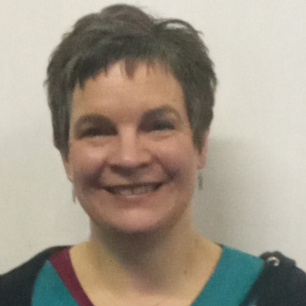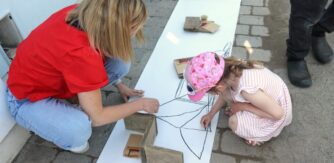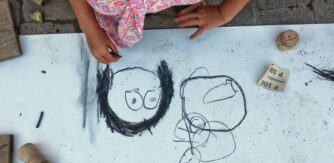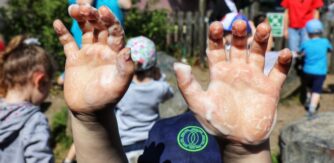Blog 1 – Lucy Davey, Educator, Farmyard Miniworld (Ballintogher Playschool)


Lucy Davey is a qualified Mental Health Nurse, Play Therapist and Early Years Educator, she owns and manages, Farmyard Miniworld (Ballintogher Playschool), a small, independent, Playschool, located in the semi-rural county Sligo village of Ballintogher.
Surrounded by picturesque landscape, including mountains, farmed and natural spaces, modern and ancient structures, Ballintogher is the perfect location for children to grow and play.
Lucy has an abiding commitment towards truly free play and her practice emphasises the benefits accrued by children, and their adults, of time spent outdoors and in the company of nature.
In her blog series, Lucy discusses her experience of being part of the Arts in Early Learning and Care (ELC) and School Age Childcare (SAC) Pilot. Ballintogher Playschool was one of nine early years settings who participated in this national pilot scheme, working in collaboration with Kids’ Own Publishing and artists Maree Hensey and Naomi Draper. The pilot took place between May to December 2023 and supported professional artists and early years educators working together to explore the Draft Principles for Engaging with the Arts in Early Learning and Care (DCEDIY 2023).
The Children at the Centre
Towards the end of our playschool year in 2023 we had the pleasure of welcoming Kids’ Own associate artists Maree Hensey and Naomi Draper into our playspace, as our playschool took part in the Arts in Early Learning and Care (ELC) and School Age Childcare (SAC) Pilot. Embarking on a journey of creativity and learning together, we put the child’s experience at the centre.
By placing the experience for the child at the centre it, the experience, becomes relevant and meaningful for the child – they are empowered and the process better reflects the individual need of each child. For example, a more confident and socially independent child will prioritise their learning through identifying and initiating contact with the newcomers. She will explore what they have to offer, what their contribution is going to be and how she can use this to further her own learning. She will embrace the new experience, quickly and enthusiastically seeking out learning e.g. “What’s your name?….What’s in your basket?….Can I have a go?….I need that” etc. etc.
A more reserved child, on the other hand, may prefer to spend his time in an observational role, building up learning through spectating, watching others, as they develop relationships and build trust. Once this phase is completed he is ready to take a more active role within the group once they become certain of expectation, roles and the new dynamics which are emerging.
Children experience art and the creative process differently to adults. Mostly children are creative in nature, possessing abundant curiosity and motivation to explore, experiment and create. Children do this all of the time through constructive play, arts and craft, mark making, dramatic role-play, musical play and physical play. It is, in fact, impossible to stop children from creating – it is how they learn.
The introduction of the artists directed the children’s learning and we observed how the child’s experience was enhanced through the patient, child-centred and facilitative approach adopted and employed by the artists.


